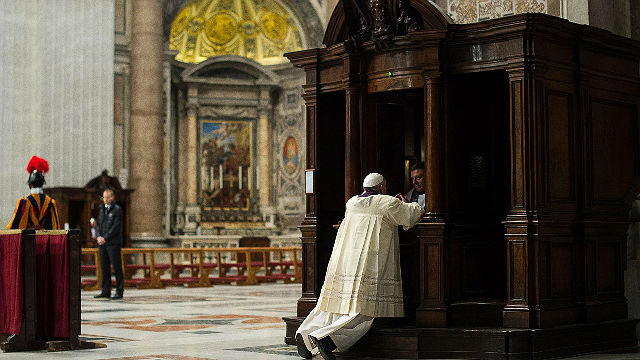

Deacon-structing Reconciliation Part 2
Deacon Pedro
Sunday, March 6, 2016

Last week, we began by looking at sin and the difference between venial and mortal sin. Even though we've all been cleansed from Original Sin at Baptism, we are all still wounded by Original Sin. Because of this, we still suffer the effects of Original Sin, which is why we have a tendency to sin. This tendency is called Concupiscence.
If you remember your grade 8 Catechism (and what I’ve written here before about Sacraments, a “Sacrament is a visible sign instituted by Christ, of an invisible Grace.” A Sacrament is an action of God and, at the same time, it is our response to that action – in a way, our response, also brings about God’s action. And so a Sacrament symbolises or points to (like a road sign points to a destination) a Grace, but at the same time, it is the very Grace it points to. Every Sacrament gives us God’s Grace, that is, the very Life of God. In the Sacrament of Reconciliation we receive the Graces that slowly bring the disorder of concupiscence into proper order.
Let’s look at what happens at Reconciliation, but first, let’s be clear that all Sacraments are instituted by Christ: After Jesus rose from the dead, the Gospel of John tells us that he appeared to the apostles. “Jesus stood among them… and he said, ‘peace be with you. As the father sent me, so I send you.’ Then he breathed on them the Holy Spirit and said, ‘receive the Holy Spirit. If you forgive the sins of any, they are forgiven them, if you retain the sins of any, they are retained.’” (John 20:19-23) This is when Jesus gave the Apostles, the power to forgive sins. The Apostles in turn passed it on to their disciples and so on until this day.
Receiving the Sacrament of Reconciliation is very simple. There are 4 elements that have to be present for the Sacrament to be valid:
-
Photo credit: CNS

- Contrition
- Confession
- Satisfaction
- God’s action through the intervention of the Church
“The formula of absolution used in the Latin Church expresses the essential elements of this sacrament: the Father of mercies is the source of all forgiveness. He effects the reconciliation of sinners through the Passover of his Son and the gift of his Spirit, through the prayer and ministry of the Church: God, the Father of mercies, through the death and the resurrection of his Son has reconciled the world to himself and sent the Holy Spirit among us for the forgiveness of sins; through the ministry of the Church may God give you pardon and peace, and I absolve you from your sins in the name of the Father, and of the Son and of the Holy Spirit.” (CCC#1449)Those are the words that a priest must say in order for the Sacrament to be valid. He can’t say, “Jesus loves you and he forgives your sins” or anything like that. He has to say, “I absolve you from your sins in the name of the Father, and of the Son and of the Holy Spirit” otherwise the Sacrament is not valid. If you do not hear the priest say those words, you should respectfully ask him to please say them. We must also remember that because it is the action of God, everything about the Sacrament is made perfect. So, if you forgot a particular sin (not “forgetting” it on purpose), if doesn’t matter, all your sins are forgiven. If you forget to do your penance (again, not “forgetting” on purpose), it doesn’t matter, satisfaction or reparation is still achieved. God perfects in the Sacrament what is lacking because of our imperfection. The Catechism also says that:
“Those who approach the Sacrament of penance obtain pardon from God’s mercy for the offense committed against him, and are, at the same time, reconciled with the Church which they have wounded by their sins and which by charity, by example, and by prayer labors for their conversion.” CCC#1422One of the main objections people have to “confession” is the part that requires us to confess to a priest. You have to wonder why 1 John 5:16-17 says that there “is such a thing as deadly sin, about which I do not say that you should pray.” Does he mean that there is some sin (mortal) that cannot be forgiven with just prayer? Can he be implying what Christians at the time already knew (and practiced), that some sin needs to be confessed to a priest out loud? We must remember that just because we are confessing to a priest doesn’t mean that we are not confessing to God. And think of this: If you confess to God in the privacy of your room, do you think that God will forgive you? Do you think it’s different if you go to Confession? I would like to think that God will forgive us if we are truly repentant and want to be better; especially if we’ve made reparation for our sin. But do you know for sure? That’s what a Sacrament does: It gives us the guarantee that something is actually taking place. We actually hear the words, “I absolve you from your sins.” It’s nice to hear it. That’s why it’s a “visible sign”. Plus, it’s true that when we sin, we are not only sinning against another human being (or against ourselves); we are sinning against God and against the Body of Christ, which is the Church. If we believe that, we must believe that we must confess to the Church. It used to be that people would have to stand in front of the whole community and confess their sins (some monasteries still have this practice). At least we now do it in privacy, just to the priest (who promptly forgets what you’ve told him). (Not to mention the therapeutic value of confession. Some people pay thousands of dollars to speak to a therapist, and they have no problem confessing to that person. The Sacrament of Reconciliation is free!) Plus, in the Sacrament of Reconciliation we get the benefit of the Grace of God that comes with the Sacrament, and our sins are forgiven. No therapist can do that! Come back next week to learn some of the other names of this Sacrament and also, some of the effects of this Sacrament. This is Part 2 of a three-part series. Read Part 1 and Part 3.
To read all about the Sacraments, you don't need to go further than this blog site: Sacraments Part 1 and Part 2. Part 3 Baptism: Part 1, Part 2 and Part 3. Reconciliation Part 1, Part 2 and Part 3 Eucharist: Part 1, Part 2, Part 3 and Part 4. Confirmation: Part 1, Part 2, Part 3, Part 4 and Part 5. Marriage: Part 1, Part 2, Part 3, Part 4, Part 5, Part 6, Part 7, Part 8, Part 9 and Part 10. Ordination: Part 1, Part 2. Anointing of the Sick: Part 1, Part 2, Part 3

Every week, Deacon Pedro takes a particular topic apart, not so much to explore or explain the subject to its fullness, but rather to provide insights that will deepen our understanding of the subject. And don’t worry, at the end of the day he always puts the pieces back together. There are no limits to deaconstructing: Write to him and ask any questions about the faith or Church teaching:pedro@saltandlighttv.org
Related Articles:
Tag: Android
Behind Vatican Walls: Apple vs. Android?
Friday, January 22, 2016
 Alicia Ambrosio
Alicia Ambrosio
This week the Pope’s message for the World Day for Social Communication was released with some fanfare at the Vatican. The real fanfare, however, was going on inside the Apostolic Palace. Pope Francis met with Apple CEO Tim Cook. The meeting comes one week after the pope met with Eric Schmidt, the chairman of Alphabet, […]
1
SUPPORT LABEL
$50
$100
$150
$250
OTHER AMOUNT
DONATE
Receive our newsletters
Stay Connected
Receive our newsletters

Stay Connected









